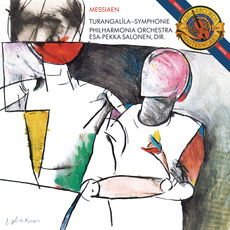On June 30th, 2018 Esa-Pekka Salonen celebrated his 60th birthday. This is often the point of maturity for a conductor. But the Helsinki-born artist isn’t just a conductor: he began his musical career studying composition and the french horn. Time doesn't seem to affect him in the same way is it does for others, partly because of the speed at which he became a notorious and well-rounded musician, and also because he maintains the youthfulness he had when he was first heard in Paris, at the Théâtre des Champs-Élysées, in 1985: Stravinsky (Pulcinella Suite) and Sibelius (Violin Concerto with Salvatore Accardo) were on the programme that day. But what caught our ear was the work he chose for the concert's finale; Max Reger’s Variations and Fugue on a Theme by Mozart. Just two years beforehand, his spectacular last-minute replacement of Michael Tilson-Thomas in Mahler’s Symphony No. 3 in London had helped him burst onto the scene. At the dawn of the CD's development, and full of youthful energy and verve, he had already released several albums (with Bis, Philips, Finlandia, soon CBS). Paraphrasing W.C. Fields, one thinks that a musician who chooses Reger in this context can't be fundamentally bad! Without knowing, the young Finnish conductor had just demonstrated his artistic power and creative intelligence.
Thirty-three years later, this initial perception has turned into a reality, turning him into something of a symbol: Esa-Pekka Salonen is one of the most unique figures of the genre that is so often naively refered to as “classical music”; that expression would probably make him smirk, as he is so firmly connected to today’s world through so many spiritual and material links. He is a technology enthusiast and an involved citizen, aware of environmental issues to the point of having founded the Baltic Sea Festival. And while Salonen now records for Signum and Pentatone (namely Stravinsky’s Persephone), the tribute box set released by Sony in 2018 (The Complete Sony Recordings, 1985-2012) was a reflection of its author’s dedication to ethics and societal commitments. A major part of his legacy is dedicated to the 20th century repertoire, and thus modern and contemporary composers (even including himself and his musical contemporaries) − with no stylistic exclusivity − are featured alongside one another: Debussy rubs shoulders with Hindemith, Nielsen with Stravinsky, Bartók with Revueltas, Jolivet and Messiaen with Lutoslawski and Ligeti, and Saariaho with Corigliano and Marsalis.
Create a free account to keep reading














